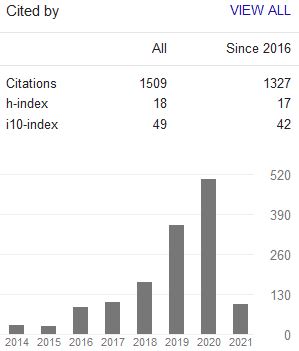GROWING EXCLUSION OF THE MAJORITY: The “Triumph of Wahhabism” and Its Threat to Indonesian Islam in the Democratic Society
Abstract
Keywords
Full Text:
PDFReferences
Addi, Lohouari. “Islam re-observed: Sanctity, Salafism, and Islamism”. The Journal of North African Studies 14 (2009).
Al-Bukhori, Abdullah bin Abdurrahim. Maa Hiya al-Salafiyyah. Cairo: Dar al-Istiqamah, 2012.
al-Qadimi, Nawaf. Asywaqul Hurriyah: Muqarabah li ‘l-Mauqif al-Salafi min al-Dimuqrathiyah. N.p.: al-Markaz al-Tsaqafiy al-Arabiy, n.d.
Engineer, Asghar Ali. Economic and Political Weekly 33, 13 (1998).
Hasan, Noorhaidi. “The Failure of the Wahhabi Campaign: Transnational Islam and the Salafi Madrasa in post9/11 Indonesia.” South East Asia Research 18, 4 (2010). Special Issue on Islamic Civil Society in South East Asia- Localization and Transnationalism in the Ummah.
Holdo, Markus. “Post-Islamism and fields of contention after the Arab Spring: Feminism, Salafism, and the Revolutionary Youth,” Third World Quarterly 38, 8 (2016)
https://Qur’an.radiorodja.com, accessed April 2016.
Interview with Abid, September 2016
Interview with K. Mustaqim, September 2016
Interview with Kajin, a personnel at the local office, September 2016.
Interview with Riyanto, September 2016.
Interview with some mosque members, “Karang Mojo”, September 2016.
Interview with Yoto, September 2016
Kassim, Abdulbasit. Defining and Understanding the Religious Philosophy of Jihādī-Salafism and the Ideology of Boko Haram.” Politics, Religion & Ideology 16 (2015).
Mamdouh G. Salameh. Saudi Arabia’s Vision 2030: A Reality or Mirage, USAEE / IAEE Working Paper Series. Http://¬ssrn.-com/abstract=2808611Ecaterina, accessed September 2017.
Mark Thompson, Being young, male and Saudi : identity and politics in a globalized kingdom. Cambridge, United Kingdom; New York, NY: Cambridge University Press, 2019.
Meijer, Roel (ed) Global Salafism: Islam’s New Religious Movement. London: Hurst and Company. 2009.
Moussa, Mohammed. “Media and learning democracy: The face of emerging political activism in Egypt”. Journal of Arab & Muslim Media Research 11, 2 (2018).
Olson, Susanne and Poljarefic, Emin. “Contemporary Salafism: Expressions, Practices, and Everyday Living.” Comparative Islamic Studies (2012).
Salim, Ahmad and al-Basyuni, ‘Amr. Maa Ba‘da al-Salafiyyah. n.p.: n.p., n.d.
Sunarwoto. “Negotiating Salafī Islam and the State: The Madkhaliyya in Indonesia.” Die Welt des Islams 60 (2020).
Volpi, Frédéric & Stein, Ewan. “Islamism and the State After the Arab Springs: Between people Power and State Power.” Democratization 22, 2 (2015).
Wiktorowicz, Quintan. “Anatomy of the Salafi Movement.” Studies of Conflict and Terrorism 29 (2016).
DOI: 10.15642/JIIS.2023.17.1.54-75
Refbacks
- There are currently no refbacks.
Indexed by:
Journal of Indonesian Islam (ISSN 1978-6301 and E-ISSN 2355-6994) is published by the Postgraduate Program (PPs) and the Institute for the Study of Religion and Society (LSAS), State Islamic University (UIN) of Sunan Ampel Surabaya.
Journal of Indonesian Islam by http://jiis.uinsby.ac.id/index.php/JIIs/index is licensed under a Creative Commons Attribution-ShareAlike 4.0 International License.
Copyright ©2020 State Islamic University (UIN) of Sunan Ampel Surabaya. Powered by Public Knowledge Project OJS.







